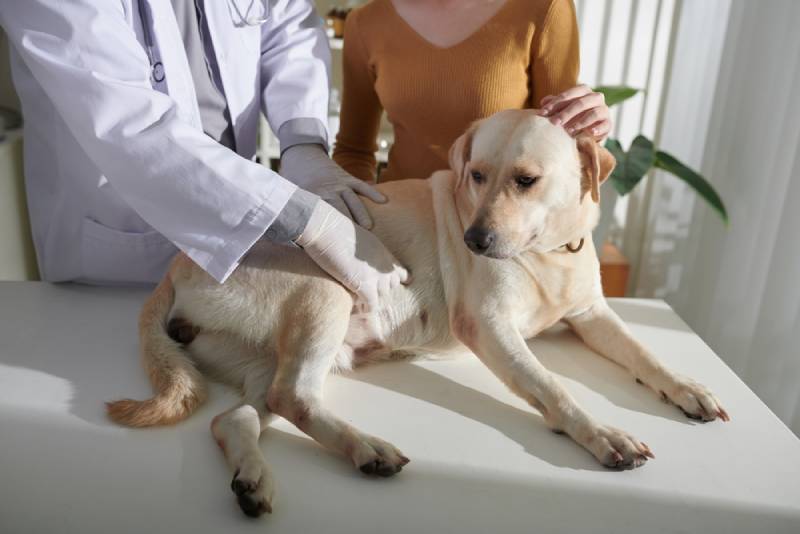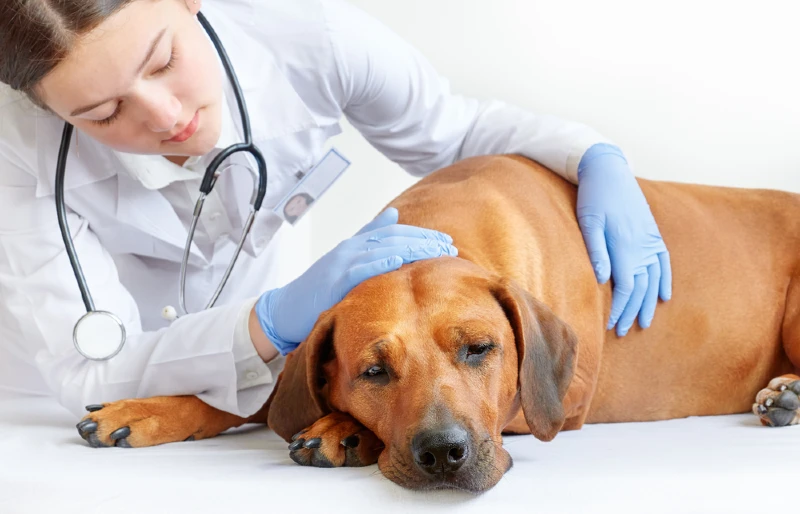Whipworms in Dogs: Our Vet Explains Causes, Signs & Treatments

Updated on

Whipworms are intestinal parasites that are quite common in dogs. The medical term for a whipworm infestation is trichocephalosis or trichuriasis, which comes from the Latin name of these parasites, Trichuris vulpis. This parasite is often transmitted to dogs after they ingest contaminated feces or other matter contaminated with infested feces.
Trichuris vulpis are small worms that resemble a whip, with one end being thick and the other being thin. Whipworms attach to the intestinal wall, causing various health problems, such as diarrhea, weight loss, and anemia.
The eggs are microscopic and shed intermittently, so several copro-parasitological examinations may be needed for diagnosis. Whipworm infestation can become severe if the affected dog is not treated with antiparasitic medication and supportive treatment (in severe cases).
What Are Whipworms?
Whipworms are parasites that belong to the Trichuridae family. They are around 30–50 millimeters long, have a whitish color with a reddish tint, and look like a whip: The head (narrow) is located at the thin end, while the tail (the thick end) houses the reproductive system. This unequally calibrated worm is also known as Trichuris vulpis and occurs frequently in dogs. They are more common in older dogs than puppies but can infest pets of any age.
Whipworms have a simple life cycle. The female adult worms lay eggs in the large intestine, which pass in the feces, reaching the environment. The eggs have an oval shape, a thick outer shell, and bipolar plugs. If the conditions are appropriate, the eggs will embryonate and become infective in 1–3 weeks. They can be ingested when dogs groom themselves or when they eat from the ground (especially contaminated feces). The eggs of T. vulpis hatch in the small intestine. After about a month, the larvae migrate to the large intestine, where they become adults that can reproduce. Due to their outer shell, the eggs are resistant to adverse conditions and can survive for years in the environment. T. vulpis does not usually infest humans, but there are a few reported cases. Humans are most frequently infested with Trichuris trichiura.

What Are the Signs of Whipworms in Dogs?
For dogs with mild infestations, there are usually no clinical signs. As the infestation becomes massive, inflammation of the large intestine may result, and any of the following clinical signs may occur:
- Low appetite
- Weight loss
- Mucus or blood in the stool
- Diarrhea (which can become chronic and difficult to control, leading to weight loss and dehydration)
- Anemia (pale gums, weakness, heavy breathing), in case of chronic and severe infestations
Rarely, a whipworm infestation can cause a syndrome similar to Addison’s disease. The clinical signs, such as the inability to regulate electrolytes and weakness, can lead to severe dehydration, which can put your dog’s life at risk.
Weight loss, dehydration, diarrhea with blood, and anemia can also be clinical signs of more severe conditions and highly contagious viral infections like parvovirus, especially if they occur in puppies. Contact your veterinarian as soon as possible if you notice any of these clinical signs or other changes in your dog’s behavior.
It is also important to note that clinical signs of whipworm infestation may be present even if eggs are not eliminated along with the dog’s feces because the disease has a prepatent stage and egg shedding is intermittent.
What Are the Causes of Whipworms in Dogs?
The whipworms lay eggs in the large intestines of the infested dog, which are passed out in the pet’s stool. The eggs then mature over a period of 1 to 3 weeks into an infective stage. The only way dogs can become infested with whipworms is by ingesting the eggs that contain the infective larva of T. vulpis.
Dogs can ingest the eggs along with feces or other matter that was contaminated with feces. Eggs can also get on your dog’s fur when they are lying on the ground or playing outside, and they may then ingest the eggs when they groom themselves.

How Are Whipworms Diagnosed in Dogs?
Whipworm eggs are microscopic, so they cannot be seen with the naked eye in your dog’s feces. They can only be detected by coproparasitological examination or blood antigen testing. However, even if your dog is infested and the adult female lays eggs, they may be difficult to see when testing dog feces because the females lay eggs intermittently. For this reason, repeated tests may be necessary. If a whipworm infestation is suspected, even if no eggs are found, it is common to prescribe antiparasitic treatment.
Moreover, whipworm infestation (in rare cases) can result in clinical signs similar to those of Addison’s disease. As a result, your veterinarian will test for that disease before anything else because this condition is severe.
What Is the Treatment for Whipworms in Dogs?
Many antiparasitic medications can successfully treat intestinal worms, including whipworms. Repeated treatments are usually recommended for best results (e.g., repeating after 3 weeks and again at 3 months). If your dog is already taking antiparasitic drugs (e.g., for heartworms), you must notify your vet about this aspect.
Also, the veterinarian will recommend that you disinfect the place where your dog sleeps or spends their time and promptly dispose of their waste because the eggs can survive for a long time in the environment.
In severe cases of T. vulpis infestation, the affected dogs will be hospitalized for supportive treatment and possibly a blood transfusion (if the anemia is severe).

How Do I Care For a Dog With Whipworms?
If your dog has been diagnosed with whipworms, all you have to do is follow your vet’s advice. This condition is not severe if it is intervened as soon as the clinical signs occur.
The condition becomes critical when chronic diarrhea, dehydration, and anemia occur. Dehydration and anemia can put your dog’s life in danger, especially if they are a puppy or have a low immune system. For this reason, it is important to deworm your dog regularly or take them to regular check-ups.
Frequently Asked Questions (FAQ)
Are Whipworms Painful for Dogs?
Yes, whipworms can be painful for dogs because they attach to the intestine and cause inflammation and discomfort. Other clinical signs of whipworm infestation in dogs are diarrhea (sometimes with blood), lethargy, lack of appetite, and weight loss. In severe cases, dehydration (due to repeated episodes of diarrhea) and anemia may occur. Contact the veterinarian if your dog shows these clinical signs.

Do Whipworms Make Dogs Hungry?
Most of the time, dogs with whipworm infestations experience a lack of appetite. But in some cases, they can cause a sudden increase in hunger. Even so, your dog can lose weight because the intestinal worms feed on the nutrients that your pet consumes.
Conclusion
Whipworms (Trichuris vulpis) are intestinal parasites that are frequently found in dogs. They can cause a lack of appetite, weight loss, diarrhea (sometimes with blood), dehydration, and even anemia. Dehydration and anemia can lead to the death of your pet if not intervened in time. The causes of infestation with T. vulpis are represented by the ingestion of eggs containing the infective larva. Eggs can be ingested along with contaminated feces, with other matter contaminated with feces, or from the fur when dogs groom. If clinical signs occur, it is important to take your dog to the vet. To prevent whipworm infestation, regular deworming is necessary.
Featured Image Credit: Dragon Images, Shutterstock











